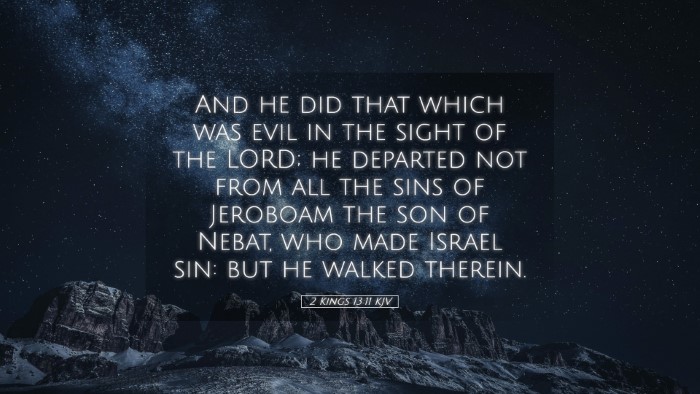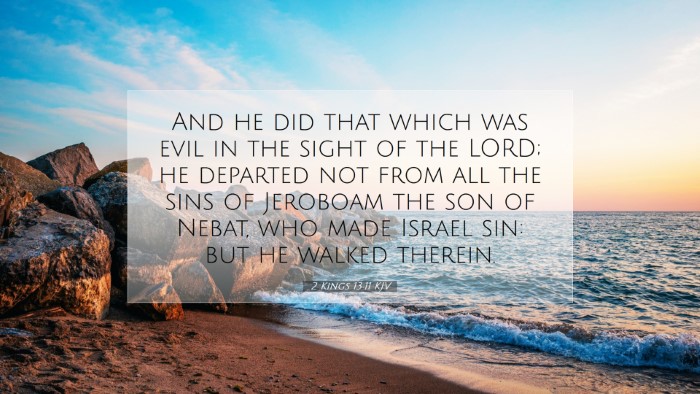Bible Commentary on 2 Kings 13:11
2 Kings 13:11 states: “And he did that which was evil in the sight of the Lord; he departed not from all the sins of Jeroboam the son of Nebat, who made Israel to sin: but he walked therein.” This brief verse captures the essence of the kingship of Jehoahaz of Israel and serves as a crucial reflection on the moral and spiritual state of Israel during his reign.
Exegesis of the Verse
The verse indicates that Jehoahaz did evil in God's sight, a recurring theme throughout the history of the kings of Israel. The phrase “he departed not from all the sins of Jeroboam” underscores a significant theological point in the history of Israel. Jeroboam's sins, primarily the establishment of unauthorized worship centers, set a precedent for the monarchy of Israel and afflicted subsequent kings.
Commentators agree that the reference to Jeroboam signifies a continuous legacy of disobedience. Jehoahaz, like several of his predecessors, not only followed in Jeroboam's sinful practices but also failed to lead the nation towards repentance and devotion to Yahweh.
Theological Implications
-
Continuity of Sin: Various commentaries highlight the historical continuity of sin from Jeroboam through successive kings down to Jehoahaz. This underscores the importance of personal and national accountability before God.
-
God’s Judgment: The actions of Jehoahaz are not presented without consequence. The sin described here leads to divine judgment. Inherent within the text is an admonition against the complacency of leaders who fail to guide their people morally and spiritually.
Matthew Henry’s Insights
According to Matthew Henry, the character of Jehoahaz is portrayed decisively as one who 'did evil'—a phrase that encapsulates the essence of his reign. Henry notes that neglecting to turn from Jeroboam's sins perpetuated a cycle of corruption, ultimately leading the nation of Israel into further moral decay.
Henry emphasizes that the true measure of any ruler should be their dedication to the worship of God. Jehoahaz's failure to seek God not only reflected his personal sin but also implied a collective guilt for the nation.
Albert Barnes on Jehoahaz
Albert Barnes elaborates on the implications of leadership and spiritual responsibility found in this text. He asserts that Jehoahaz's decisions had grave ramifications on the worship practices of Israel. The king's inability to break away from previous sins resulted in Israel's spiritual stagnation and decline.
Barnes also comments on the public response to such leadership, suggesting that the king's moral failure directly affected the nation’s alignment with God, leading to suffering and downfall. The sins of the king brought divine displeasure, not only upon himself but upon the entire kingdom.
Adam Clarke’s Observations
Adam Clarke provides insights into the context surrounding 2 Kings 13:11. He reflects on the historic consequences of Jeroboam's sin, explaining how the idolatrous practices established during that time created a lasting influence in the lives of the people, making them resistant to spiritual reform.
Clarke adds that Jehoahaz's actions illustrate a broader principle: that where leaders fail to uphold godliness, societies often follow suit. His description of the spiritual apathy mirrored in Jehoahaz’s reign serves as a warning against neglecting one's spiritual obligations.
Conclusion
The commentary on 2 Kings 13:11 serves as a poignant reminder of the devastating impact of ungodly leadership. For pastors, students, and scholars, this text encourages a reflection on the importance of righteous leadership grounded in a commitment to God. As demonstrated through Jehoahaz's failures, spiritual integrity is crucial not just for individual leaders but for the entirety of the church and the nation.
Ultimately, 2 Kings 13:11 presents an urgent call to evaluate our own lives and the lives of those in leadership. It asks us to consider the effects of our actions on our communities and invites us towards a path of righteousness that aligns with God’s purposes.


